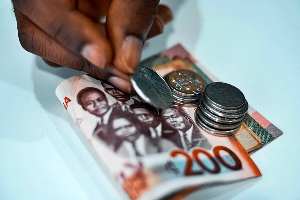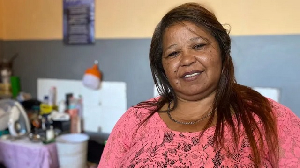- Home - News
- TWI News | TV
- Polls
- Year In Review
- News Archive
- Crime & Punishment
- Politics
- Regional
- Editorial
- Health
- Ghanaians Abroad
- Tabloid
- Africa
- Religion
- Election 2020
- Coronavirus
- News Videos | TV
- Photo Archives
- News Headlines
- Press Release
General News of Monday, 20 December 2010
Source: B&FT
Oil Will Deliver Change, Not Trouble
Ghanaians welcomed the country's first oil on Wednesday optimistic they can enjoy the economic benefits without the troubles that oil wealth has brought other African countries.
"It is a blessing," said Andy Kwame Amuzu, a 50-year-old taxi driver at Takoradi, which has been transformed from a small fishing village into a hub for Ghana's oil industry in just three years.
"So many other countries have suffered from mismanagement -- we are learning from their mistakes. I believe we will be different," he added as former presidents, local chiefs and oil executives gathered in the town to mark the first barrel from an offshore platform 40 miles (60 km) out to sea.
Decades of oil production in a string of other African nations have often fomented conflict, corruption and economic imbalances rather than promote economic and social progress. Now all eyes are on whether Ghana, widely-praised for holding a peaceful transfer of power after a hotly-contested election in 2008, can buck the trend.
The government has sought to play down hopes that oil will end Ghana's problems overnight, and allay fears that it will detract from other industries like cocoa and the mining of gold, which are currently the mainstay of the economy.
Production will start at 120,000 barrels per day before doubling in three years. Yet at current crude prices, oil revenues per person will come to just $160 a year, even before the industry takes its share.
Amid the pomp and ceremony, with images of President John Atta Mills turning on the taps out at sea projected on a 12-foot screen in Takoradi, hopes are nonetheless high. "When the oil comes it will bring jobs and money to our businesses," said Brian Salmon, who owns a small market stall selling clothes and leather bags.
"I've seen many developments already," he added, citing the banks and building sites that have sprouted up across town with the arrival of the oil industry. Four-wheel drive vehicles clog previously quiet streets.
DO THE OIL MONEY DANCE At the ceremony, dancers dressed up in oil workers' boots, overalls and hard hats pretended to hand out cash to simply-dressed Ghanaians.
But residents are also already complaining about the negative side of the oil bandwagon coming to town -- rocketing rents, insufficient healthcare and a rise in drug abuse and prostitution.
"They've given out people's accommodation to the oil people in Takoradi so there are lots of homeless people because of the oil which has come," said 23-year-old student Rose Arthur.
"My major concern is that we must see development is shifted from Accra. They must recruit people here not in Accra," she added, echoing long-held complaints that oil riches in Africa are too often squandered by governments and the elite rather than trickle down to benefit local communities.
Traditional chiefs of towns in Ghana's western region, off whose shores the oil is being pumped, last month demanded a 10 percent share of the oil revenues. This has underscored concerns over exactly how the revenues will be used, with Ghana starting to pump oil before its parliament has passed legislation on revenue sharing.
Yet, a combination of political stability, oil wells being located far offshore rather in populated creeks that are easily polluted, and lessons learned from other countries, ranging from Nigeria to Norway and Trinidad, leave Ghanaians optimistic.
"Normally when oil comes everybody is fighting to get their daily bread, but we Ghanaians have an understanding and will avoid conflict," Salmon said..










